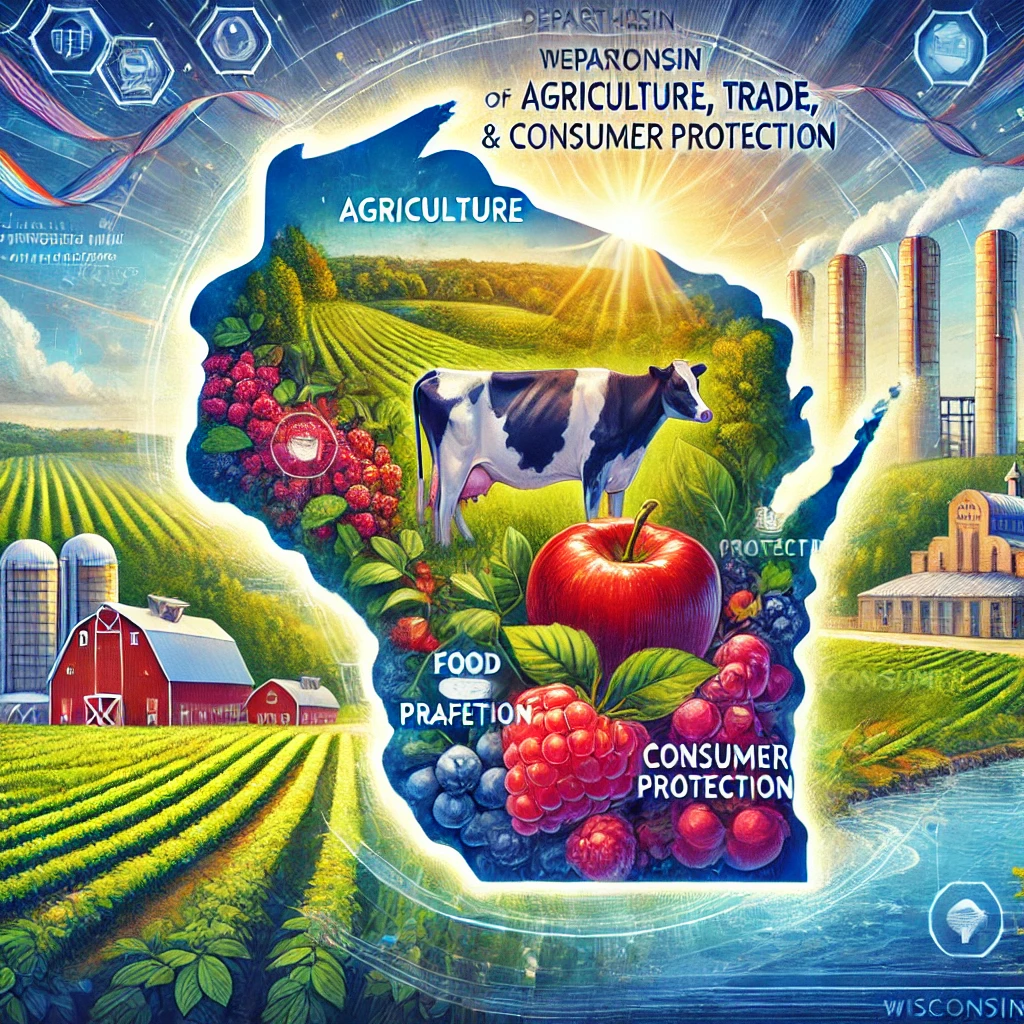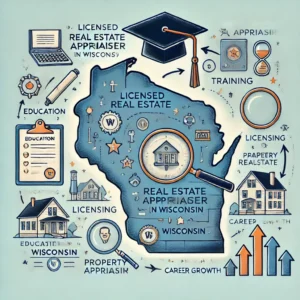The Role of Wisconsin’s Department of Agriculture, Trade, and Consumer Protection in Shaping the State’s Economy and Public Safety
The Wisconsin Department of Agriculture, Trade, and Consumer Protection (DATCP) plays a vital role in maintaining and regulating a wide range of sectors across the state. The agency’s multifaceted operations contribute significantly to Wisconsin’s economy and public health, from ensuring food safety to promoting agricultural exports and protecting consumer rights. The department’s mission extends beyond agriculture, influencing consumer protection, trade regulations, and environmental sustainability. In this article, we explore the impact of the DATCP, its key responsibilities, and how its initiatives help foster economic growth and public welfare across Wisconsin.
- Promoting Agricultural Growth and Innovation
Wisconsin’s agricultural sector is a cornerstone of the state’s economy. The state is known for its diverse range of products, from dairy to cranberries, and has been at the forefront of agricultural innovation. The DATCP helps farmers grow their operations through various programs, incentives, and regulations.
Wisconsin leads in the production of many crops, such as cranberries (more than half of the national crop), oats, potatoes, tart cherries, and ginseng, of which the state produces 97% of the U.S. supply. DATCP provides critical support to these industries by facilitating trade, offering grants for research and innovation, and ensuring that producers meet national and international standards. Promoting export markets is crucial for Wisconsin’s economy, mainly as the state produces far more agricultural products than it can consume.
To help farmers navigate an increasingly competitive global marketplace, the DATCP works with organizations like the Wisconsin Farm Bureau Federation and the Dairy Farmers of Wisconsin. The department’s efforts to create international trade opportunities have particularly benefited dairy farmers, helping them maintain strong ties with major markets in Canada, Mexico, and China. Through collaboration with the U.S. Department of Agriculture (USDA) and other federal entities, the DATCP ensures that Wisconsin’s agricultural sector remains competitive.
- Ensuring Food Safety and Quality
One of the DATCP’s core functions is to ensure that food products are safe and meet regulatory standards. Food safety is essential for public health and consumer confidence, which directly affects economic performance. The department conducts inspections of food processing plants, restaurants, and farms, ensuring compliance with health and safety regulations. This is particularly important for Wisconsin’s dairy industry, which relies heavily on the state’s reputation for producing high-quality, safe products.
A notable function within this scope is DATCP’s oversight of milk quality. The department ensures that milk meets strict safety standards before it reaches the consumer. Milk haulers, for example, play a crucial role in this process by collecting milk samples and ensuring that the product is free from contamination before it is processed. In recent years, Wisconsin has seen a rise in enforcing fines related to violations, particularly regarding food safety. This proactive approach, which includes progressively increasing penalties for repeat offenders, helps deter businesses from cutting corners and ensures that consumers receive the total value of the products they purchase.
- Consumer Protection and Trade Regulation
The DATCP is equally committed to protecting Wisconsin consumers from unfair business practices and ensuring a fair marketplace. The department oversees various activities, including investigating fraud, addressing consumer complaints, and regulating trade practices. It works to enforce laws that protect consumers from deceptive advertising, predatory lending, and unsafe products. In 2022 alone, the department recovered over $300,000 from businesses that were not delivering the promised value to consumers, with a particular focus on issues like fuel quality and product misrepresentation.
The DATCP’s consumer protection division also manages the Wisconsin Consumer Protection Hotline, where residents can report fraud, seek guidance on rights and responsibilities, and file complaints about businesses. This hotline is invaluable for ensuring that consumer rights are upheld across the state.
- Environmental Sustainability and Land Use
Agriculture in Wisconsin isn’t just about productivity; it’s also about stewardship of the land. The DATCP promotes environmentally responsible farming practices that ensure the long-term sustainability of Wisconsin’s rich agricultural heritage. This involves regulating pesticide use, supporting soil conservation, and encouraging sustainable water management practices. Given the challenges posed by climate change, such as extreme weather conditions and soil degradation, these efforts are more critical than ever.
In addition to overseeing the responsible use of natural resources, DATCP regulates pesticide application to protect public health and the environment. The Wisconsin Pesticide Applicator License is a critical tool in this effort, ensuring that those who apply chemicals on farms are trained and certified to do so safely.
The department also runs initiatives encouraging farmers to adopt new technologies and sustainable farming methods. For example, it provides grants for research into organic farming and promotes the use of renewable energy on farms. These programs help farmers reduce their environmental impact while maintaining productivity.
- Licensing and Regulation of Businesses
Apart from its agricultural focus, the DATCP regulates various businesses and professionals nationwide. Through its licensing division, the department ensures that businesses operate within the legal framework, maintaining high standards of service and safety. The Wisconsin Department of Safety and Professional Services (DSPS) also plays a crucial role in overseeing more than 200 types of credentials for businesses and professionals, ensuring they meet the required standards. This contributes to a well-regulated marketplace where consumers can trust the services and products they purchase.
In recent years, the DATCP has focused on streamlining the licensing process, making it easier for businesses to comply with regulations while ensuring that safety standards are upheld. The department also provides a comprehensive license lookup service, allowing consumers to verify the credentials of professionals they hire, from contractors to pesticide applicators.
- Supporting Rural Communities and Farmers
Rural communities are the backbone of Wisconsin’s agricultural economy, and the DATCP plays an essential role in supporting them. In collaboration with the state government, the department has introduced initiatives to improve the quality of life for rural residents. These include expanding access to high-speed broadband, enhancing rural healthcare infrastructure, and investing in local transportation networks.
In the 2019-2021 biennial budget, the state government allocated $78 million toward improving rural broadband access. This investment ensures that rural areas are included in the digital age, giving farmers access to vital online resources and helping local businesses reach new markets. Broadband access is crucial for everything from marketing agricultural products online to accessing telehealth services and modern educational tools.
Healthcare in rural communities is another area of focus. The DATCP has advocated for expanding Medicaid to rural residents, recognizing that healthcare accessibility is critical for sustaining rural populations. By keeping rural hospitals and clinics open and accessible, the state aims to maintain healthy communities and support the agricultural labor force.
- The Future of Wisconsin Agriculture
Looking ahead, the DATCP remains focused on innovation and growth in the agricultural sector. As consumer preferences change, Wisconsin farmers’ products must, too. The department is working closely with the University of Wisconsin’s Center for Dairy Research to explore new uses for milk, particularly in light of declining fluid milk consumption. With investments in research, such as the $750,000 allocated to the dairy sector, Wisconsin aims to stay at the forefront of agricultural innovation, developing new dairy products that can appeal to a broader range of consumers.
Moreover, the DATCP continues to foster relationships with international markets. Recent trade missions to countries like Mexico have underscored Wisconsin’s role as a leader in agricultural exports. By promoting Wisconsin’s agricultural products abroad, the department is helping to secure a prosperous future for the state’s farmers.
Conclusion
The Wisconsin Department of Agriculture, Trade, and Consumer Protection is integral to the state’s economy, public health, and environmental sustainability. From supporting farmers to protecting consumers and ensuring fair trade practices, the DATCP’s work touches every corner of the state. By fostering innovation in agriculture, regulating business practices, and ensuring food safety, the department helps to provide a thriving economy and a healthy population. As the agricultural sector continues to evolve, the DATCP’s role in promoting sustainable growth and fair market practices will remain essential for Wisconsin’s future.




